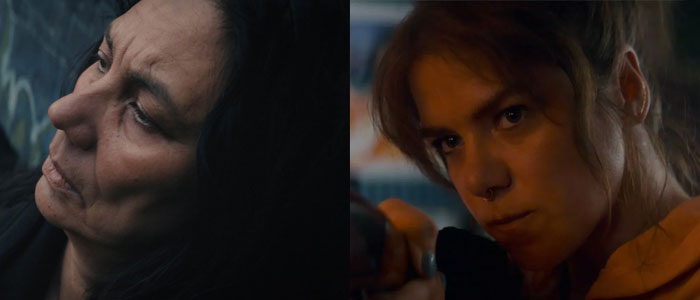ABERDEEN
**/****
starring Gail Maurice, Billy Merasty, Liam Stewart-Kanigan, Jennifer Podemski
written and directed by Ryan Cooper and Eva Thomas
SEEDS
***/****
starring Kaniehtiio Horn, Patrick Garrow, Dylan Cook, Graham Greene
written and directed by Kaniehtiio Horn
by Bill Chambers It opens on a manipulative but striking juxtaposition. A First Nations girl, Aberdeen (Ashlyn Cote-Squire), and her little brother Boyd (Lucas Schacht) go fishing with their grandparents at a lake–a sun-dappled tableau that fades out on young Aberdeen’s bright smile and fades back in to find middle-aged Aberdeen (Gail Maurice) passed out on a bench, being kicked awake by the turtleneck Gestapo on park patrol. Across town, Boyd (Ryan R. Black) is at the doctor, receiving the devastating news that he’s terminally ill. As he’s taking this in, his phone rings: could he come get his big sis out of jail? There’s an implied “this time” when the police inform Boyd that Aberdeen’s lucky they’re not pressing criminal charges, but Boyd, espying a Bible on the officer’s desk, appeals to the man’s religious convictions (and gambles on his latent racism) in blaming her actions on a “beer demon,” saying he’s been trying to get her to church. The Indigenous people we meet in Aberdeen have to be nimble code-switchers to navigate the world, and that’s something our proud, mercurial heroine steadfastly isn’t. She’s all out of fucks to give–that is, until Boyd informs her of his cancer, which has forced him to place her grandchildren, who became Aberdeen’s responsibility after her drug-addicted daughter ran away (and then Boyd’s when flooding left Aberdeen unhoused), in foster care. With a white family, no less, something “Abby” resents more than Boyd, who was raised in a white home, apart from his sister. For Aberdeen, it feels like nothing is ours and everything is theirs. What follows is a Dardennes-ian narrative in which an anxious Abby attempts to clean up her act faster than the ticker of red tape will allow.
To that end, she seeks the Virgil-ish guidance of old friend Alfred (Billy Merasty). Alfred and his boy toy, Raven (Liam Stewart-Kanigan), first take Abby to the Office of Indigenous Affairs to get her a status card, but the location to apply for one changes from week to week, she doesn’t have an appointment, she’s lost the ID she needs to obtain the application, and it will take three months to prove she’s First Nations. That’s if they don’t penalize her for swearing and lunging at government employees. Next comes a failed attempt to secure a basic Manitoba ID: She’s asked for a driver’s license, and of course she doesn’t have that, either–and she blows her top once more. Alfred then remembers it’s Treaty Days and they have money they can pick up. But although she has $6 coming to her, Abby is unable to collect even this paltry sum without an ID. Her quest is not a total loss, though. She runs into someone from her past named–and here you can sense the filmmakers patting themselves on the back a bit too strenuously–Grace (Jennifer Podemski), an accountant for the First Nations community who sets Aberdeen up with a status card and a change of clothes. Later, a good Samaritan who recognizes Abby from before the flood, or pretends to, gives her money and a ride in his pickup. As much as the movie shows how the oppression of Indigenous peoples continues in a passive, regulated form, it also depicts status and non-status Indians lifting each other up to level the power dynamics amongst themselves. Abby may be disenfranchised, but she does have a community.
Aberdeen is a frustrating film with a frustrating lead. These two things are not unrelated, as both become shrilly, counterproductively histrionic. A story about the Kafka hell of being poor and nonwhite gets smothered by a deus ex tragedy, while a First Nations woman’s perfectly reasonable bitterness and rage prove so irrepressible that it numbs our compassion, which is one of the ways the system wins: by humiliating us with our emotional response to its bureaucratic detachment. You wish there were more notes to Abby, if only so the movie could function as drama and not just the blues. Aberdeen–a loaded title for Gen-Xers, symbolic of Kurt Cobain’s gloomy upbringing–is by no means uninvolving, but what I’ll remember from it is Alfred, a familiar, even tired archetype (i.e., the wise and witty gay best friend) Merasty transcends in a beautiful performance that channels a bit of suave Ben from Blue Velvet without ever succumbing to caricature. When Abby takes Alfred’s feelings for granted late in the film, his righteous fury is palpable in a way that makes hers seem bratty and superficial by comparison, and I wondered, not for the first time, whether Aberdeen had hitched its wagon to the wrong star.
In Seeds, an incidental palate cleanser of sorts from triple-threat Kaniehtiio Horn, a young Mohawk woman, Ziggy (Horn), has made a name for herself as an influencer by fashioning tribal lore into Instagram content. (Sample nugget: “…I could feel the hundreds of years’ worth of rage flowing through me. My people’s rage just sizzling below the surface, ready to burst–but thankfully, through the combination of therapy, CBD oil, and snuggles from my emotional-support cat Potato, I’m good!”) Called back to her reservation to housesit for her aunt, Ziggy learns that local seed caches are going missing. Not so coincidentally, she’s just taken a job posting cute videos about artisanal seeds for health-food company Nature’s Oath, naïve to their evil agenda. (I’m reluctant to label Seeds a horror movie, but Nature’s Oath’s ballooning control of seed distribution threatening Indigenous food sovereignty is scarily plausible.) Soon a Michael Clayton goon (Patrick Garrow, a dead ringer for Brad Dourif) is breaking into her aunt’s house, losing an appendage to the brave Potato, and forcing Ziggy to go the full Home Alone on his ass. From the cat attack to the restless plotting (Ziggy’s bosses get murdery with her her first day on the job) to the preposterous climax, Seeds is so endearingly absurd I hope I’m laughing with and not at it. Certainly, an extended cameo from Graham Greene, playing himself as the host of Ziggy’s favourite true-crime show and the eventual voice of her subconscious, suggests that tongues are planted firmly in cheek here. For all that, the tone isn’t mocking, more gonzo in the manner of the folk tales we hear at the start of the film (one of which foreshadows the villains’ fate), and Ziggy’s journey back to motherhood following a miscarriage is surprisingly tender. Seeds–it’s a metaphor for pregnancy, it’s a cautionary tale about corporate bedfellows, it’s the proverbial spoonful of sugar. Programme (both films): Discovery






